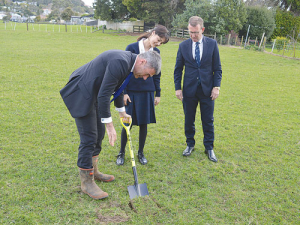Auckland secondary schoolers will soon get a close look at farming without travelling far.
A new centre to display the best of the primary sector is being built at Mount Albert Grammar School in west-central Auckland.
The $14 million project was announced in 2015 by the landowner ASB Bank.
Primary Industries Minister Nathan Guy last week was on hand for the turning of the first soil.
Mount Albert Grammar School’s ASB Farm, set up in 1932, will become the AgriFood Experience Centre, showing primary sector careers and making possible new connections in Auckland.
“The primary industries play an incredibly important role in our economy,” said Guy.
“This centre will play a big part in telling this story to younger, urban audiences.”
The primary sector faces a challenge to attract 50,000 more employees over the next 10 years; Guy sees the new centre as a “game changer” to reach that target.
“This centre will help showcase the most innovative developments in primary industries to Auckland students, and will help close the divide between urban students and their awareness of the careers open to them in the primary sector.”
It will also give students an awareness of the work done in agrifood via a hands-on learning approach.
Mt Albert Grammar principal Patrick Drumm says the new centre will provide a great opportunity for the best and brightest MAGS students.
“Gumboots will still have a place in the agricultural and horticultural careers of today, but of increasing importance are skills in science, technology and business, and an understanding of people and the need to sustain our environment,” he says.
“The ASB MAGS Farm has proved an asset for thousands of MAGS students the 95 years of our existence as a school.”
Drumm says MAGS students are at the centre of the story: the new facility will lift teaching capacity in agricultural and horticultural subjects and agribusiness from its current 160 to 500.


















